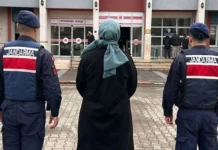Turkish police detained 30 people in raids carried out in İzmir for alleged links to the faith-based Gülen movement, the TR724 news website reported on Friday.
The İzmir Chief Public Prosecutor’s Office issued detention warrants for 32 individuals on allegations of association with the movement, based on witness testimony and interactions on the ByLock messaging app.
Among those were 27 police officers who were dismissed by an emergency decree in the aftermath of a July 2016 coup attempt.
The testimony comes from a supposed secret witness known only as “Garson” (Waiter), whose testimony was used to dismiss nearly 10,000 police officers.
However, the credibility of Garson’s testimony has been severely undermined by recent findings suggesting that his signatures on key documents may have been forged. Dr. Gökhan Güneş, a human rights lawyer, released documents demonstrating significant discrepancies in Garson’s signatures across different legal depositions given a week apart.
These concerns about the authenticity of the witness testimony are compounded by international and domestic legal opinions. The European Court of Human Rights (ECtHR) had previously ruled that secret witness testimony, commonly accepted in Turkish courts against political dissidents, cannot alone substantiate convictions.
Similarly, Turkey’s Constitutional Court ruled that the statement of an eyewitness could not be regarded as evidence of terrorism in the case of a former military officer imprisoned in late 2017 over alleged links to the Gülen movement.
Although the ECtHR has in several cases made clear that use of the ByLock messaging app does not constitute a criminal offense, following the coup attempt the Turkish government accepted using the application, which was available on Apple’s App Store and Google Play, for identifying and arresting alleged followers of the movement on charges of membership in a terrorist organization.
Turkish President Recep Tayyip Erdoğan has been targeting followers of the Gülen movement, inspired by Turkish Muslim cleric Fethullah Gülen, since the corruption investigations of December 17-25, 2013, which implicated then-prime minister Erdoğan, his family members and his inner circle.
Dismissing the investigations as a Gülenist coup and conspiracy against his government, Erdoğan designated the movement as a terrorist organization and began to target its members. He intensified the crackdown on the movement following an abortive putsch in July 2016 that he accused Gülen of masterminding. Gülen and the movement strongly deny involvement in the coup attempt or any terrorist activity.
Following the abortive putsch, the Turkish government declared a state of emergency and carried out a massive purge of state institutions under the pretext of an anti-coup fight. More than 130,000 public servants, including 4,156 judges and prosecutors, as well as 29,444 members of the armed forces were summarily removed from their jobs for alleged membership in or relationships with “terrorist organizations” by emergency decree-laws subject to neither judicial nor parliamentary scrutiny.















